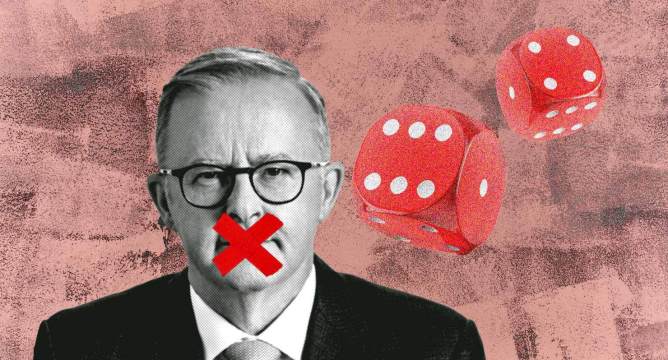This article is an instalment in a new series, Punted, on the government’s failure to reform gambling advertising.
Last month, an Australian soccer Facebook group called A-League Memes posted a screenshot to its 103,000 followers of an X post about a $300,000 bet made by rapper Drake on a soccer match.
A-League Meme’s screenshot was captioned simply “gamble responsibly”, a tagline that was until recently a requirement for online gambling advertising.
Was this a paid advertisement? Or was it just a piece of content about gambling shared of their own accord? A-League Memes didn’t immediately respond to Crikey’s questions, but the ambiguity about whether something is a legitimate, authentic endorsement or something that’s been sponsored is a common experience in the shadowy world of online gambling content.
Amid a furore over the government’s plans to reject a full ban on television advertising for gambling services in favour of a limit, which was leaked to the media, less focus has been given to the accompanying proposal to ban betting ads on social media and other digital platforms — and how hard it’ll be to enact.
A 2023 ACMA report found that close to a quarter of gambling advertising spending was on social media and online display advertisements. This figure likely drastically underestimates the overall figure due to forms of “dark” advertising that don’t show up in traditional forms of advertising monitoring like native and influencer marketing as well as content marketing. For the same reason, these are harder to regulate out of existence, if they’re even considered as part of a ban.
Consider a traditional online advertisement: these are typically branded with the name of a sports betting company and its products. These are easy to regulate and police.
Native and influencer marketing is when an existing creator — whether it’s a fun person you follow on social media or maybe something from the sporting league itself — creates a piece of content themselves to specifically promote a product, service or brand. An example might be a former AFL star saying how much they like to bet with one service on their Instagram account, or filming an endorsement to go on the company’s social media accounts. In podcasting, there’s a proliferation of hosts reading ads on behalf of gambling companies. In the last quarter of last year, three of the top ten Australian podcasting advertisers were gambling companies.
This kind of advertising works because it taps into someone or something’s existing goodwill with their audience, and may not even seem like advertising at all. A 12-year-old boy in an Australian study said that this kind of gambling ad works because it shows off gambling from someone with whom they have a strong connection: “Well, if my idol, my favourite YouTuber, Instagrammer, TikToker is gambling maybe I should give it a try,” he said.
For the same reason, it’s extremely hard to police or regulate. Influencers and businesses are required to clearly disclose when something is an advertisement under Australian consumer law, but 81% of influencers reviewed in a sweep by the consumer watchdog didn’t appear to be adequately doing so. Unlike a social media advertising ban which would affect a few major platforms, there’s an endless number of advertisers and creators to keep an eye on and little transparency about their dealings.
Then there’s the content produced by gambling companies themselves that advertises their services. Often promoted with advertising, this content is like any other form of entertainment except it’s produced by the company with the intention of promoting itself. One of the major Australian betting companies, Sportsbet, has a YouTube channel with more than 100,000 subscribers and posts videos, often skits, that have been viewed millions of times.
It also publishes podcasts — like the Sportsbet AFL podcast In The Back Pocket, hosted by former AFL players Kane Cornes, Isaac Smith and Kate McCarthy — that frequently chart in the top five of Australian fantasy sports podcasts. On a micro level, this also includes the highly popular social media accounts of sports betting companies, which pump out memes and other content to grow their audience. This doesn’t fit under the traditional definition of advertising but is a crucial source of direct-to-audience promotion.
Another form of promotion that’s emerged in the last few years is social betting. With the launch of betting company Dabble in 2021 and Sportbet’s recent “Feed” product, gambling companies are trying to entice customers to spend on their platform by allowing them to connect with each other — like if TAB owned Facebook and let you use it to place bets directly. Sportsbet described their Feed product as “you get to see and if you so wish, copy, marvellous multis and red-hot betting tips from not just your mates, but from Sportsbet’s celebrity ambassadors.”
These features both future-proof them from any advertising ban and encourage their users to centre their social lives around gambling.
While an advertising ban on Meta or Google takes away one of their arrows, the gambling companies have plenty more in their quiver. Even if the federal government goes ahead with this plan, gambling promotion will find a way to exist online.
Anyone affected by problem gambling can get immediate assistance by calling the National Gambling Helpline on 1800 858 858 for free, professional and confidential support 24 hours a day, seven days a week.
Have you or your family encountered sneaky forms of non-traditional gambling ads? Let us know your thoughts by writing to [email protected]. Please include your full name to be considered for publication. We reserve the right to edit for length and clarity.
